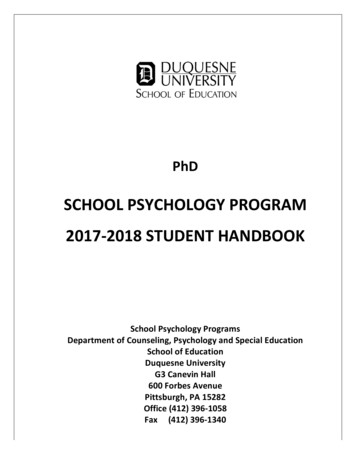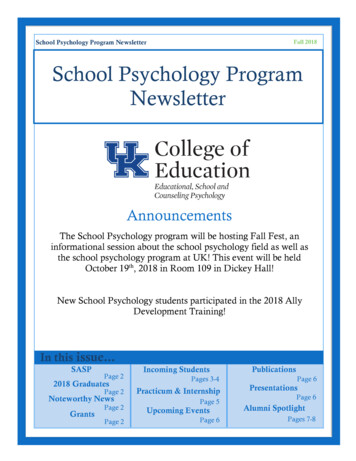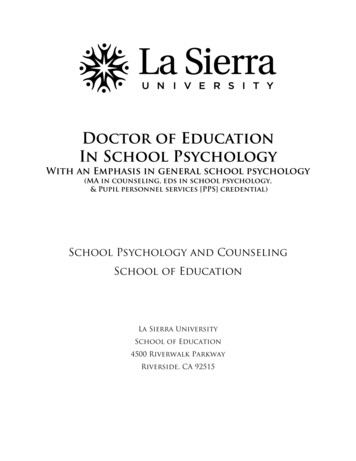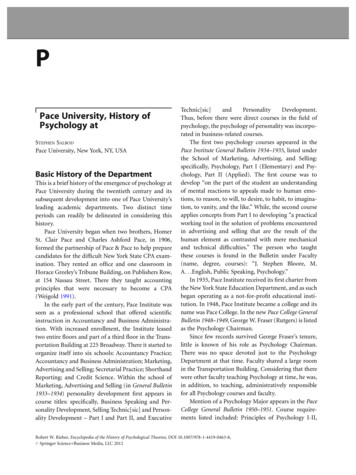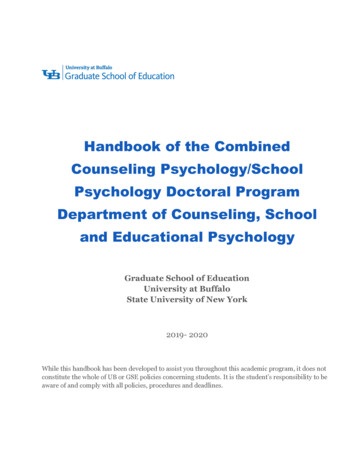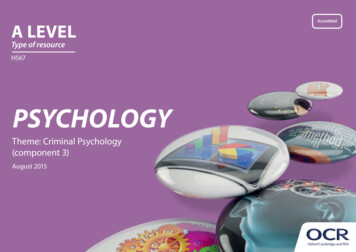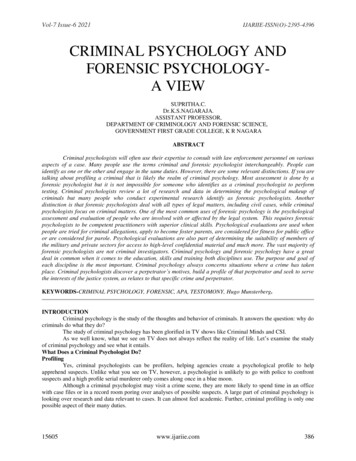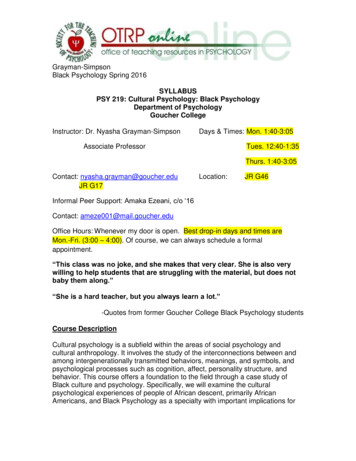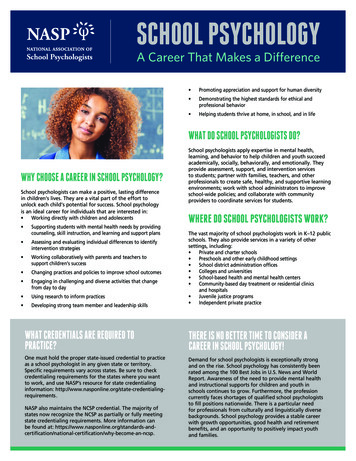
Transcription
SCHOOL PSYCHOLOGYA Career That Makes a Difference Promoting appreciation and support for human diversity Demonstrating the highest standards for ethical andprofessional behavior Helping students thrive at home, in school, and in lifeWHAT DO SCHOOL PSYCHOLOGISTS DO?WHY CHOOSE A CAREER IN SCHOOL PSYCHOLOGY?School psychologists can make a positive, lasting differencein children’s lives. They are a vital part of the effort tounlock each child’s potential for success. School psychologyis an ideal career for individuals that are interested in: Working directly with children and adolescents Supporting students with mental health needs by providingcounseling, skill instruction, and learning and support plans Assessing and evaluating individual differences to identifyintervention strategies Working collaboratively with parents and teachers tosupport children’s success Changing practices and policies to improve school outcomes Engaging in challenging and diverse activities that changefrom day to day Using research to inform practices Developing strong team member and leadership skillsSchool psychologists apply expertise in mental health,learning, and behavior to help children and youth succeedacademically, socially, behaviorally, and emotionally. Theyprovide assessment, support, and intervention servicesto students; partner with families, teachers, and otherprofessionals to create safe, healthy, and supportive learningenvironments; work with school administrators to improveschool-wide policies; and collaborate with communityproviders to coordinate services for students.WHERE DO SCHOOL PSYCHOLOGISTS WORK?The vast majority of school psychologists work in K–12 publicschools. They also provide services in a variety of othersettings, including: Private and charter schools Preschools and other early childhood settings School district administration offices Colleges and universities School-based health and mental health centers Community-based day treatment or residential clinicsand hospitals Juvenile justice programs Independent private practiceWHAT CREDENTIALS ARE REQUIRED TOPRACTICE?THERE IS NO BETTER TIME TO CONSIDER ACAREER IN SCHOOL PSYCHOLOGY!One must hold the proper state-issued credential to practiceas a school psychologist in any given state or territory.Specific requirements vary across states. Be sure to checkcredentialing requirements for the states where you wantto work, and use NASP’s resource for state credentialinginformation: rements.Demand for school psychologists is exceptionally strongand on the rise. School psychology has consistently beenrated among the 100 Best Jobs in U.S. News and WorldReport. Awareness of the need to provide mental healthand instructional supports for children and youth inschools continues to grow. Furthermore, the professioncurrently faces shortages of qualified school psychologiststo fill positions nationwide. There is a particular needfor professionals from culturally and linguistically diversebackgrounds. School psychology provides a stable careerwith growth opportunities, good health and retirementbenefits, and an opportunity to positively impact youthand families.NASP also maintains the NCSP credential. The majority ofstates now recognize the NCSP as partially or fully meetingstate credentialing requirements. More information canbe found at: ion/national-certification/why-become-an-ncsp.
WHAT EDUCATION IS REQUIRED TO BECOME A SCHOOLPSYCHOLOGIST?WHAT TRAINING DO SCHOOLPSYCHOLOGISTS RECEIVE?States typically require a graduate degree and supervised experience inschool psychology to work as a school psychologist. Specific admission criteriaand application procedures for graduate programs in school psychology vary,although they often require a Bachelor’s degree with a major in psychology,child development, sociology, or education. At a minimum, it is helpful tohave introductory courses in one or more of the following: Child development General and child psychology Statistics, measurement, and research methods Philosophy and theories of education Instruction and curriculum Special educationSchool psychologists’ training emphasizes usingresearch-based methods, understanding bothindividual and environmental factors influencinglearning and behavior, and individual and systemslevel interventions. More specifically, schoolpsychologists develop knowledge and skills in areassuch as: Data collection and Crisis preparedness,analysisresponse, and Assessmentrecovery Resilience and risk Family–school–factorscommunity Consultation andcollaborationcollaboration Diversity in Academic/learningdevelopment andinterventionslearning Mental and Cultural competencebehavioral health Research and Instructional supportprogram evaluation Prevention and Professional ethicsintervention servicesand school law Special educationservicesSchool psychology programs may also give preference to applicants withprevious experience working with youth in settings that include recreationalcamps, classrooms, mentor programs, day care centers, or after schoolprograms. Although seldom required, a teaching degree or experience cansometimes improve the potential for admission. Applicants interested inrespecialization (e.g., current mental health professional or educator lookingfor a career change) should contact graduate programs of interest forinformation.WHAT DEGREES ARE OFFERED?School psychologists typically complete either a specialist-level degreeprogram (at least 60 graduate semester hours and usually three years) or adoctoral degree (at least 90 graduate semester hours and often five to sixyears). Both degrees culminate in a year-long 1,200- to 1,500-hour supervisedinternship. The specialist-level degree is the national standard for entry intothe field and allows for comprehensive practice and career advancement inschools. A doctoral degree is also appropriate for practicing in schools andis essential to working in academia and pursuing certain research interests.Some universities offer both degrees, allowing students in the specialist-levelprogram to transfer to the doctoral program within the first two years ofcoursework.WHAT ARE THE CONSIDERATIONS FORSELECTING A GRADUATE PROGRAM?Applicants should apply to programs specifically titled“school psychology.” There are over 300 such programs inthe United States. Some factors to consider include: Doctoral program versus specialist-level degreeprogram Program approval/accreditation status Faculty qualifications, specializations, and interests Size of program Location (region, type of community) Practicum and internship opportunities Research opportunities Availability of financial support Employment rates of program graduatesFind additional information about selecting a graduateprogram and access to our program database “I became a schoolpsychologist because I have a passionfor working with and helpingkids accomplish their goals. I alsolove working in a school settingand collaborating with teams ofcoworkers to solve problems.”—Lynsi, WisconsinWHAT IS A NASP-APPROVED PROGRAM?The National Association of School Psychologists (NASP)sets standards for graduate preparation, credentialing,professional practice, and ethics. NASP approves bothspecialist-level and doctoral programs that meet itsgraduate preparation standards. Graduates of NASPapproved programs receive quality preparation across alldomains of practice and can have a streamlined process forapplying for the Nationally Certified School Psychologist(NCSP) credential.A complete list of NASP-approved programs is also availableat: 340 East West Highway, Suite 402Bethesda, MD 20814866-331-6277 or 301-657-0270www.nasponline.org
SCHOOL PSYCHOLOGISTSsupport students’ ability to learn andteachers’ ability to teach.THEY ARE EXPERTS INLearningLearningBehaviorBehaviorMentalMental HealthHealthSchoolSchool SystemsSystemsTHEY PROVIDEAcademic, behavioral, and mental health supportsEvaluation, assessment, and data analysisConsultation with teachers and familiesCulturally responsive servicesCrisis prevention and responseTHEY SUPPORTStruggling and diverse learnersStudent achievement and well-beingSafe and supportive learning environmentsSchool–family–community partnershipsSchool-wide data-based decision makingTHEY SERVEin schools andother educationaland clinical settings.RECOMMENDED RATIO1schoolpsychologist per500–700studentsLowering barriers to learning is critical tochildren's success in school.Contact your school psychologist to find outhow they can help.School Psychologists:Helping Children Thrive In School At Home In Lifewww.nasponline.org
Ayudan a los niños a progresarEn la escuela En el hogar En la vidawww.nasponline.org
Who AreSCHOOLPSYCHOLOGISTS?WHAT DO SCHOOL PSYCHOLOGISTS DO?School psychologists provide direct support and interventions to students; consult with teachers,families, and other school-employed mental health professionals (i.e., school counselors, schoolsocial workers) to improve support strategies; work with school administrators to improve school-widepractices and policies; and collaborate with community providers to coordinate needed services.School psychologists help schools successfully:Improve Academic AchievementCreate Safe, Positive School Climates Promote student motivation and engagementConduct psychological and academic assessmentsIndividualize instruction and interventionsManage student and classroom behaviorMonitor student progressCollect and interpret student and classroom dataReduce inappropriate referrals to special education.Promote Positive Behavior and Mental Health Improve students communication and social skillsAssess student emotional and behavioral needsProvide individual and group counselingPromote problem solving, anger management, and conflictresolutionReinforce positive coping skills and resiliencePromote positive peer relationships and social problemsolvingMake referrals to and coordinate services with communitybased providersSupport Diverse Learners Assess diverse learning needsProvide culturally responsive services to students andfamilies from diverse backgroundsPlan appropriate Individualized Education Programs forstudents with disabilitiesModify and adapt curricula and instructionAdjust classroom facilities and routines to improve studentengagement and learningMonitor and effectively communicate with parents aboutstudent progress Prevent bullying and other forms of violenceSupport social–emotional learningAssess school climate and improve school connectednessImplement and promote positive discipline and restorativejusticeImplement school-wide positive behavioral supportsIdentify at-risk students and school vulnerabilitiesProvide crisis prevention and intervention servicesStrengthen Family–School Partnerships Help families understand their children’s learning andmental health needsAssist in navigating special education processesConnect families with community service providers whennecessaryHelp effectively engage families with teachers and otherschool staffEnhance staff understanding of and responsiveness todiverse cultures and backgroundsHelp students transition between school and communitylearning environments, such as residential treatment orjuvenile justice programsImprove School-Wide Assessment and Accountability Monitor individual student progress in academics andbehaviorGenerate and interpret useful student and school outcomedataCollect and analyze data on risk and protective factorsrelated to student outcomesPlan services at the district, building, classroom, andindividual levelsNASP empowers school psychologists by advancingeffective practices to improve students’ learning, behavior,and mental health.www.nasponline.org
SCHOOL PSYCHOLOGISTS HELP STUDENTS THRIVESchool psychologists are uniquely qualified members of schoolteams that support students’ ability to learn and teachers’ abilityto teach. They apply expertise in mental health, learning, andbehavior to help children and youth succeed academically,socially, behaviorally, and emotionally. School psychologistspartner with families, teachers, school administrators, and otherprofessionals to create safe, healthy, and supportive learningenvironments that strengthen connections between home,school, and the community.WHAT TRAINING DO SCHOOL PSYCHOLOGISTS RECEIVE?School psychologists receive specialized advanced graduate preparation that includes coursework and practical experiences relevantto both psychology and education. School psychologists typically complete either a specialist-level degree program (at least 60graduate semester hours) or a doctoral degree (at least 90 graduate semester hours), both of which include a year-long 1,200-hoursupervised internship. Graduate preparation develops knowledge and skills in: Data collection and analysisAssessmentProgress monitoringSchool-wide practices to promote learningResilience and risk factorsConsultation and collaborationAcademic/learning interventionsMental health interventionsBehavioral interventions Instructional supportPrevention and intervention servicesSpecial education servicesCrisis preparedness, response, and recoveryFamily–school–community collaborationDiversity in development and learningResearch and program evaluationProfessional ethics, school law, and systemsSchool psychologists must be credentialed by the state in which they work. They also may be nationally certified by the NationalSchool Psychology Certification Board (NSPCB). The National Association of School Psychologists (NASP) sets standards for graduatepreparation, credentialing, professional practice, and ethics. The NASP Practice Model (2010) outlines the comprehensive servicesthat school psychologists are encouraged to provide and can be accessed at www.nasponline.org/practicemodel.WHERE DO SCHOOLPSYCHOLOGISTS WORK?WHY DO CHILDREN AND YOUTH NEEDSCHOOL PSYCHOLOGISTS?HOW DO I CONTACT A SCHOOLPSYCHOLOGIST?The vast majority of schoolpsychologists work in K–12 publicschools. They also provide services ina variety of other settings, including:All children and youth can face problemsfrom time to time related to learning, socialrelationships, making difficult decisions, ormanaging emotions such as depression,anxiety, worry, or isolation. Schoolpsychologists help students, families,educators, and members of the communityunderstand and resolve both long-term, chronicproblems and short-term issues that studentsmay face. They understand how these issuesaffect learning, behavior, well-being, andschool engagement. School psychologists arehighly skilled and ready resources in the effortto ensure that all children and youth thrive inschool, at home, and in life.Every school has access to theservices of a school psychologist,although some school psychologistsserve two or more schools so maynot be at a particular school everyday. Most often, school psychologistscan be reached by inquiring at theschool directly or at the district’scentral office, or by locating contactinformation on the school or districtwebsite. Private schoolsPreschoolsSchool district administrationofficesUniversitiesSchool-based health and mentalhealth centersCommunity-based day treatmentor residential clinics and hospitalsJuvenile justice programsIndependent private practice 2014 National Association of SchoolPsychologists, 4340 East West Hwy., Suite 402,Bethesda, MD 20814, 301-657-0270
The National Association of School Psychologists (NASP) sets standards for graduate preparation, credentialing, professional practice, and ethics. NASP approves both specialist-level and doctoral programs that meet its graduate preparation standards. Graduates of NASP
